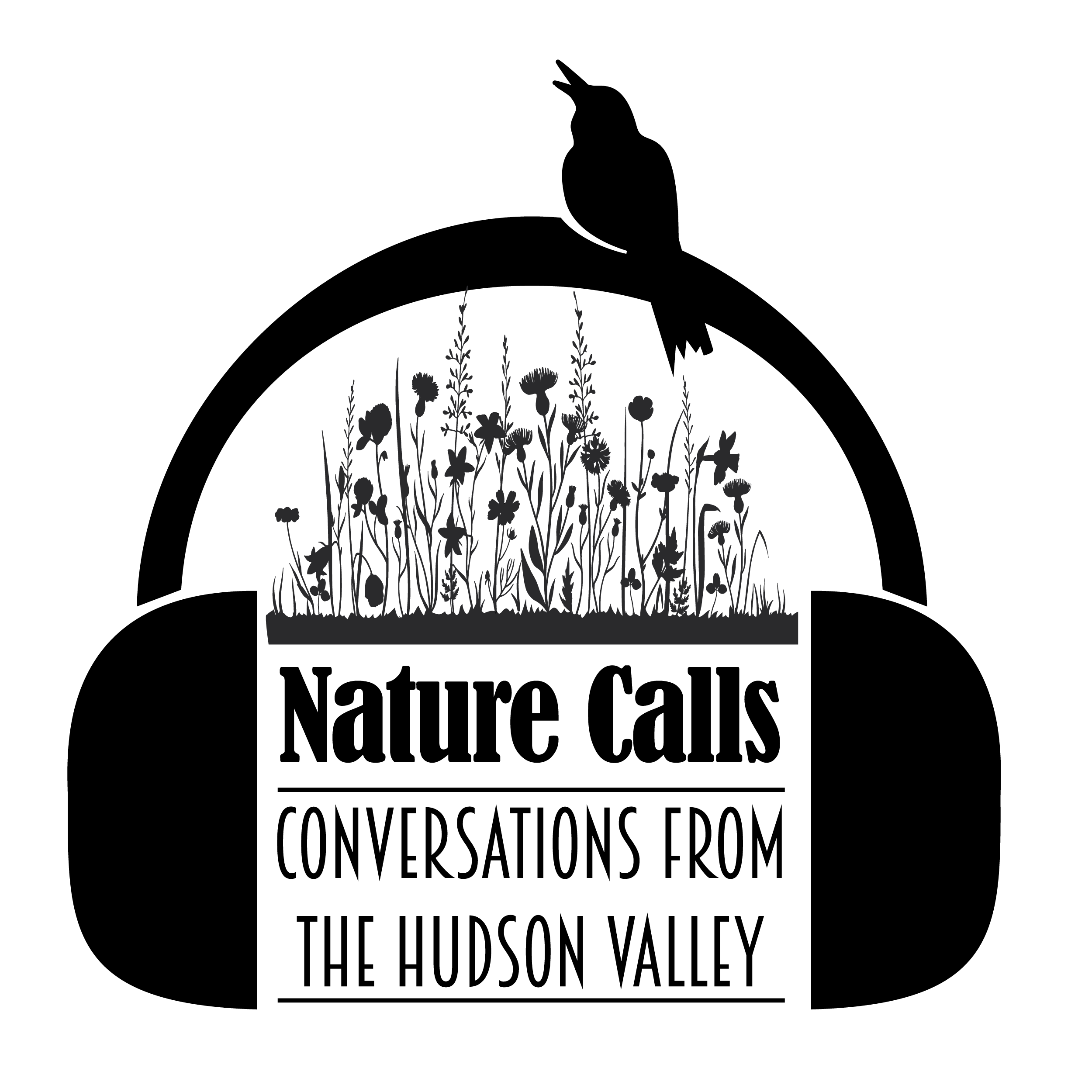Episodes
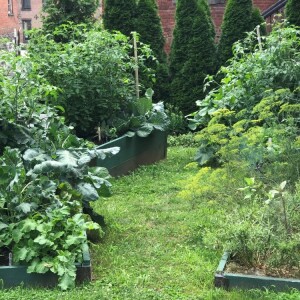
Thursday Feb 22, 2024
Episode 109: Veggie Patch Retrospective (Part 1)
Thursday Feb 22, 2024
Thursday Feb 22, 2024
It’s that time of year to start dreaming about and planning for your vegetable garden. Whether you are a novice gardener or an experienced one, there is always something new to learn.
So we’ve pulled together a treat for you! Listen to this compilation of five already aired short segments specific to vegetable gardening. In this Veggie Patch Retrospective (part 1), you’ll learn from Master Gardener Volunteer, Teresa Golden, how to:
- determine the best place to site your garden,
- choose what veggies to plant to best serve the needs of your family,
- prepare the soil for a productive crop yield,
- start seeds at home,
- grow a family of vegetables called brassicas such as cabbage, broccoli, brussel sprouts, and cauliflower
Also, check out the rich set of resource links below that can help you with your garden. There’s more to come, so make sure to check back for the next two parts of this sequence. We aim to demystify how to grow your own vegetable garden and/or help your garden be more productive.
Host: Teresa Golden
Photo By: Teresa Golden
Production Support: Linda Aydlett, Deven Connelly, Teresa Golden, Xandra Powers, Annie Scibienski
Resources
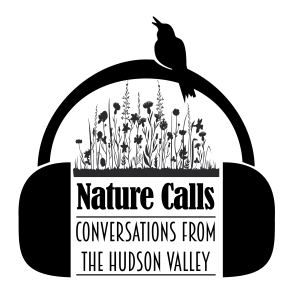
Thursday Feb 15, 2024
Episode 108: NYS Forest Rangers
Thursday Feb 15, 2024
Thursday Feb 15, 2024
Forest rangers are the wilderness’ police department. Think of them as ‘guardians of nature’ who protect and conserve natural resources in forests and parks. Their jurisdiction usually encompasses terrain filled with wildlife and treacherous landscapes. Forest rangers are often unsung heroes who work long hours in extreme conditions.
Many people associate forest rangers with "Smokey Bear', the lovable bear who warned us not to start forest fires. But rangers do more than prevent and fight fires. They are involved in law enforcement, firefighting, search and rescue, as well as public education and outreach.
Unfortunately, forest fires continue to be a threat to New York State’s forests and forest rangers are at the front lines in the fight against forest fires. They help educate and train fire departments in the best course of action to fight fires. They also engage in preventive measures, which may include setting controlled burns or clearing brush that may be a potential hazard in the event of fire. When a fire occurs, forest rangers work in conjunction with local fire fighters in controlling and putting out the fire. After a fire is contained, the rangers conduct investigations to determine the cause and source of the fire.
Every year hikers, campers and casual visitors get lost in the wilderness of state forests in the Hudson Valley. When they do, it is the forest rangers who play a critical role in search and rescue operations. Rangers travel over rough terrain in search of lost people. They help coordinate and lead search teams through the forest. Rangers are skilled in emergency training so they can administer first aid if needed. Forest rangers also keep track of campers and hikers by the use of checkpoints at the entries to parks and forests. This helps them monitor the number of visitors in the forest as well as alerts them to when someone could potentially have gotten lost, if they do not check out at the expected time.
Keeping the forests safe for visitors and wildlife is the most important part of a ranger’s job. Learn more from Anastasia Alwine, a New York State Forest Ranger, who joins the podcast, Nature Calls: Conversations from the Hudson Valley, in an informative discussion of the role of forest rangers in the Hudson Valley. Anastasia is from Syracuse, NY, and graduated from Cornell University as an art major. Prior to taking the civil service exam, she wasn’t aware that the Forest Ranger job existed, but you will hear how she loves working at this role now.
Hosts: Annie Scibienski and Jean Thomas
Guest: Anastasia Alwine
Photo by: Department of Environmental Conservation (DEC)
Production Support: Linda Aydlett, Deven Connelly, Teresa Golden, Xandra Powers, Annie Scibienski
Resources

Thursday Feb 08, 2024
Episode 107: Master Naturalist Program
Thursday Feb 08, 2024
Thursday Feb 08, 2024
Are you a nature lover? Are you interested in conservation or habitat restoration? Do you have a passion for our natural environment or want to learn more about the ecosystems, habitats, plants, and animals of New York State? Then this program might be for you!
The Master Naturalist Program is a science-based training program designed to teach adults about New York’s natural resources, empowering them to educate others and participate in on-the-ground conservation and monitoring projects.
The Nature Calls: Conversations from the Hudson Valley podcast team had the opportunity to meet with Kristi Sullivan, Director, NY Master Naturalist Program and Extension Associate, at Cornell University’s College of Agriculture and Life Sciences. With a focus on natural resources and the environment, Kristi was a ‘natural’ to create the Master Naturalist Program in New York State.
Over 500 people have completed this adult education program, with ~100+ active volunteers (who have reported their hours) in any given year. Only 30 people are admitted into the program each year, so there is an application process to be followed to ensure broader coverage across the state. You can become a Master Naturalist by taking the 16-hour mandatory “Naturalist Trainee” course, supplemented by 14 hours of additional coursework and 30 hours of volunteer work tailored to your personal interests. The mandatory “Naturalist Trainee” course is held at Cornell’s Arnot Teaching and Research Forest located in Ithaca, NY. It covers topics such as reptiles and amphibians, invasive species identification and control, insects, bats, ferns, wildlife and more.
Volunteer opportunities may include “hands-on” management, conservation or monitoring activities, or educational outreach. Examples of appropriate volunteer activities include working with a local land trust or nearby park to remove or monitor invasive species, collecting citizen science data for an ongoing program, inventorying wildflowers at a local park or preserve, participating in riparian buffer plantings or restoration, conducting wildlife surveys, contributing to water quality monitoring or research. Potential outreach activities may include leading a “woods walk”, writing articles, giving presentations, or developing educational brochures. Each Master Naturalist can pursue volunteer activities tailored to her/his own interests and strengths.
Always remember that YOU can make a difference in the natural environment.
Hosts: Tim Kennelty and Jean Thomas
Guest: Kristi Sullivan
Photo by: Tim Kennelty
Production Support: Linda Aydlett, Deven Connelly, Teresa Golden, Xandra Powers, Annie Scibienski
Resources

Thursday Feb 01, 2024
Episode 106: Great Backyard Bird Count
Thursday Feb 01, 2024
Thursday Feb 01, 2024
If you like birds, you will love this episode! Birds spark a deep wonder and help us to understand the living world. When birds disappear, they’re signaling that we’ve stressed our landscapes and oceans. When we make changes and they rebound, it signals hope that we can find ways to flourish and protect the natural world.
Becca Rodomsky-Bish, Project Leader from Cornell University's Lab of Ornithology, joins us in a wonderful conversation about our feathered friends, the Lab, and the Great Backyard Bird Count (GBBC). Becca's focus in environmental education includes native habitats, sustainability, and conservation. Beyond the Lab, she is an avid gardener creating beautiful gardens to feed her family as well as the wildlife in her area.
The “GBBC” is a February event that has united birdwatchers around the world for over 25 years. For one weekend each year, citizen scientists submit their bird observations from their home or in their community. The GBBC engages backyard bird watchers and helps guide people in creating bird-friendly homes and yards. This is something that everyone can engage in as a citizen scientist.
And it’s just one project supported by the Cornell Lab of Ornithology whose mission is to interpret and conserve the Earth’s biological diversity through research, education, and citizen science focused on birds and nature. The Lab brings together the agility and impact of an on-the-ground nonprofit organization with world-class science and teaching as part of Cornell University’s College of Agriculture and Life Sciences. Together, they transform data into knowledge by pioneering new techniques that combine citizen science, machine learning, and data visualizations. Their studies explore the earth’s biodiversity, the processes that have generated it, and ways to conserve this abundance of life. Key partners in much of this research are the many thousands of people who volunteer for citizen-science projects.
The Lab created Merlin, a very popular application that helps identify birds by answering some simple questions, or via their photos, songs and calls. The Lab also developed and manages eBird, a database that engages a global audience in sharing observations to empower research and conservation of birds and ecosystems. Through the exploration, analysis, and visualization of massive data sets, insights are revealed on the distribution, movements, status, and trends of birds through time and across hemispheres.
Learn how you can participate in this process with the Great Backyard Bird Count.
Hosts: Tim Kennelty and Jean Thomas
Guest: Becca Rodomsky-Bish
Photo by: Cornell University Lab of Ornithology
Production Support: Linda Aydlett, Deven Connolly, Teresa Golden, Xandra Powers, Annie Scibienski
Resources

Thursday Jan 25, 2024
Episode 105: NYS Master Gardener Program
Thursday Jan 25, 2024
Thursday Jan 25, 2024
The podcast team recently took a road trip to Cornell University in Ithaca, NY to meet with Ashley Helmholdt, Extension Associate, Cornell Garden-Based Learning, School of Integrative Plant Science Horticulture. With a passionate interest in garden-based learning, Ashley manages the New York State Master Gardener Volunteer and Seed to Supper programs as well as professional development for Cornell Cooperative Extension educators.
She shares a bit of the history of the MGV program which recently celebrated its 50th anniversary. She’s heavily involved in the continual enhancements to the program and shares her enthusiasm for what’s to come. She also talks extensively about the Seed to Supper program, a six-session series, which helps new vegetable gardeners get started. Vegetable Varieties for New York State is also under her purview which is an excellent resource to help gardeners select varieties that will grow well in New York soils and climate.
The Cornell Cooperative Extension Master Gardener Volunteer network is also working to strengthen understanding and inspire us to take action in our gardens and communities that will help address the global crisis of climate change. Supporting this effort, a curriculum is available for gardeners, homeowners, educators, volunteers, teachers, students, and anyone interested in exploring how we might examine our gardening practice through the lens of climate change mitigation and adaptation.
If you are interested in the Master Gardener Program in Columbia and Greene Counties or have a gardening question, please call or email the Master Gardeners at (518) 826-3345 ext 212 or ColumbiaGreeneMGV@cornell.edu. If you live outside these counties, please contact your local county extension office.
Hosts: Tim Kennelty and Jean Thomas
Guest: Ashley Helmholdt

Thursday Jan 18, 2024
Episode 104: An MGV's Perspective
Thursday Jan 18, 2024
Thursday Jan 18, 2024
The Master Gardener Volunteer Program is a nationwide educational program, and in New York State, consists of a corps of volunteers who are trained by Cornell Cooperative Extension in the science and art of gardening. Master Gardener Volunteers are volunteers from the community who enjoy gardening and use their horticultural skills and expertise to educate others. In return for their training, Master Gardener Volunteers donate their time teaching the community about their gardening and the environment. Master Gardener Volunteer activities might include offering lectures and workshops at libraries, schools and in the community, answering horticultural inquiries, creating and staffing horticultural booths at shows and fairs, providing advice to the public at farmer’s markets, garden centers and other venues, and Increasing awareness of integrated pest management, water quality and conservation and other environmental issues. Being a Master Gardener Volunteer is both a rewarding and gratifying experience. Master Gardeners add beauty and knowledge to the many lives they touch.
In this episode, Rosemary Armao joins the Nature Calls: Conversations from the Hudson Valley podcast with a perspective on the Master Gardener Volunteer program. As a recent graduate of the training process in Albany County, she provides a candid discussion about the training process as well as what she’s learned being a Master Gardener.
Rosemary Armao, a native of Albany, is an adjunct professor of journalism at UAlbany. She has worked as a reporter and editor at various wire services and newspapers. She has trained journalists and worked on media development projects throughout Eastern Europe and Africa. She is also a former executive director of Investigative Reporters and Editors and former president of the Journalism and Women Symposium. She also has her own podcast, Armao on the Brink, which is focused on a discussion of the biggest stories across the globe that are bring society and culture to the brink of an abyss.
As a relatively new Master Gardener, her MGV perspective might be of interest to anyone considering becoming one. She talks about the rigors and rewards of the program during the training as well as ‘post-graduation’. Because she took the classes during the pandemic, the process was modified due to the inability to meet in person during that time period.
She discusses some of the key things she learned as a result of the training which includes leveraging the experience of other gardeners, learning from web sites of land grant universities, reading seed catalogues, and the value of hands-on experience. Rosemary helps to demystify the process of becoming an MGV and as well as what’s involved with volunteering with Cornell Cooperative Extension.
If you are interested in becoming a Master Gardener Volunteer, contact your local Cornell Cooperative Extension to ask about the schedule for training classes in your county.
Hosts: Jean Thomas and Teresa Golden
Guest: Rosemary Armao
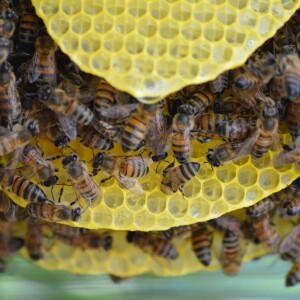
Thursday Jan 11, 2024
Episode 103: Hum of the Hive Retrospective - Part 2
Thursday Jan 11, 2024
Thursday Jan 11, 2024
In Part 2 of the Hum of the Hive retrospective, we’ve once again combined multiple (4) short segments together. So, make sure to listen to the end to hear them all! Hum of the Hive, featuring Linda Aydlett, follows the honeybee through the four seasons.
In the first segment, field bees are the focus of attention. Linda describes the various resources required by a hive to survive. To gather these resources, experienced foraging bees, also called scout bees, use a ‘waggle dance’ to communicate where the nectar or other resources can be found. Listening to this, you’ll appreciate why the field bees are the hardest working members of the hive.
Next, we shift to what happens to a honeybee colony in the spring. Many hives, that are running out of room, swarm to divide the colony. But this is not an impulsive decision. Many preparations are required to successfully accomplish this. The queen needs conditioning to be able to fly to a new location. Scout bees have to find potential places to relocate, and then use the waggle dance to communicate options. Once a favored location is selected, the colony flies off to its new home.
In the third segment, learn about propolis. Some resin honeybees collect resin from trees and shrubs and carry it back to the hive. Then, cementing bees remove the resin from the resin collecting bees and apply it to various uses within the hive. It can be used to seal cracks and crevices in preparation for the winter months, but resin also protects the colony from diseases, due to its multiple beneficial properties.
Finally, in the fourth segment, we shift to the summer months when water may be in short supply. This is called a dearth. Measures are taken to survive in difficult times. For example, they may limit the size of the colony by not allowing drones to return to the hive. Fewer bees mean fewer mouths to feed. They might also resort to cannibalism, or robbery to ensure the continuation of the colony. It can be tough to be a bee!
We welcome your feedback on the first or our retrospective series to help you find content on a specific topic in one place. E-mail us at colgremg@cornell.edu.
Resources
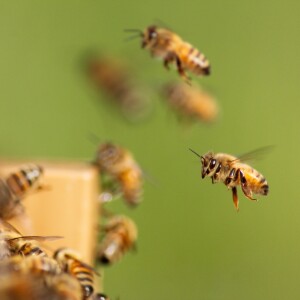
Thursday Jan 04, 2024
Episode 102: Hum of the Hive Retrospective (Part 1)
Thursday Jan 04, 2024
Thursday Jan 04, 2024
With this episode, we are introducing the first of our retrospective series. These periodic episodes compile previously aired short segments on a specific topic. This one, features Master Beekeeper and podcast co-founder, Linda Aydlett and is all about honeybees.
This episode starts with some fascinating insights into how honeybees survive in winter. Their secret? They form winter clusters and shiver to keep each other nice and warm. Then stay tuned for the next segment to learn about the roles honeybees must fulfill within the hive. Linda describes the life of a Queen Bee, which turns out not to be as glamorous as the name might imply. As the only fertile egg layer, the queen bee is focused solely on perpetuating the colony. Learn about the importance of nutrient-rich royal jelly that helps the queen successfully perform her role.
But there’s even more! This episode concludes with a description of the worker caste of honeybees. They represent the largest number of bees in the hive. The role of the worker bees is to perform all the other functions required for the hive to thrive. Unlike the queen bee, the worker bee’s role evolves over her relatively short lifespan from a nurse bee to a house bee, and finally to a field bee. This segment focuses mostly on the house bee as it transitions to a field bee. Fascinating indeed!
Hosts: Tim Kennelty and Jean Thomas
Guest: Linda Aydlett
Photo by: Damien TUPINIER on Unsplash
Production Support: Linda Aydlett, Deven Connelly, Teresa Golden, Xandra Powers, and Annie Scibienski
Resources
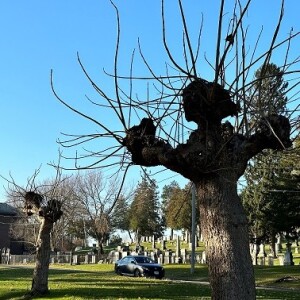
Thursday Dec 28, 2023
Episode 101: Pollarding
Thursday Dec 28, 2023
Thursday Dec 28, 2023
William Bryant Logan re-joins the Nature Calls: Conversations from the Hudson Valley podcast in a fascinating discussion about pollarding, a pruning practice. Bill is the author of Sprout Lands, Oak, Air, and Dirt, the last of which was made into an award-winning documentary. In addition to being the executive director of Landis Arboretum, he is on the faculty of the New York Botanical Garden. He has spent the last three decades working in trees. He is a certified arborist, and founder and president of Urban Arborists, Inc.
In earlier times, regions could not prosper without its inhabitants knowing how to cut their trees so they would sprout again. Pruning the trees didn’t destroy them. Rather it created healthier, more sustainable and diverse woodlands.
Pollarding is a pruning system involving the removal of the upper branches of a tree, which promotes the growth of a dense head of foliage and branches. The practice was a common practice in Europe since medieval times, and takes place today in urban areas worldwide, primarily to maintain trees at a determined height or to place new shoots out of the reach of grazing animals.
Traditionally, people pollarded trees for fodder (to feed livestock) or for wood. Fodder pollards produced "pollard hay" for livestock feed; they were pruned at intervals of two to six years so their leafy material would be most abundant. Wood pollards were pruned at longer intervals of eight to fifteen years, a pruning cycle tending to produce upright poles favored for fencing and boat construction. Nowadays, the practice is typically used for ornamental trees.
Pollarding tends to help trees live longer by maintaining them in a partially juvenile state and by reducing the weight and windage of the top part of the tree. Older pollards often become hollow, so it can be difficult to determine age accurately. Pollards tend to grow slowly, with denser growth-rings in the years immediately after cutting.
Learn more about this practice in New York State on this episode of Nature Calls: Conversations from the Hudson Valley.
Hosts: Tim Kennelty and Jean Thomas
Guest: Bill Logan
Photo by: Teresa Golden
Production Support: Linda Aydlett, Deven Connelly, Teresa Golden, Xandra Powers, and Annie Scibienski
Recording
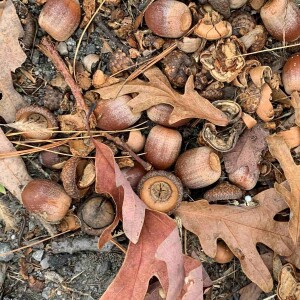
Thursday Dec 21, 2023
Episode 100: Oak Trees
Thursday Dec 21, 2023
Thursday Dec 21, 2023
William Bryant Logan joins the Nature Calls: Conversations for the Hudson Valley podcast to talk about Oak Trees in New York State. Having spent the last three decades working in trees as a certified arborist, Bill is the author of Sprout Lands, Oak, Air and Dirt, the last of which was made into an award-winning documentary. He is on the faculty of the New York Botanical Garden. He joins us for a two part discussion. The first is on oak trees. The second (up next) will be about pollarding.
Oaks are one of the oldest and most widely spread trees on earth. They existed well before humans, most likely between 40 million and 60 million years ago.
Did you know that there are nearly 600 species of oak trees. They all fall into two categories: white oaks (with rounded lobe leaves) or red oaks (pointed lobe leaves).
The highest population of oak trees can be found in North America, especially in Mexico, where about 160 species grow, and 109 of those are endemic. Ninety species live in the US. The national tree of America is the oak tree.
Oak trees are so resilient because their seeds are cased in hard shells (acorns). Acorns and leaves are coated with tannic acid, which also prevents fungi and insects from harming them.
All oaks produce acorns, but because they only ripen on adult trees, they symbolize patience and endurance.
An oak can produce ~10 million acorns during its lifetime, but only 1 in 10,000 acorns grows up to be another oak tree. The rest become a key food source for birds (e.g. woodpeckers, ducks, pigeons), small mammals (squirrels, chipmunks, mice), as well as larger mammals (deer, bears).
Acorns are nutritious and contain large amounts of protein, carbs, fats, phosphorus, potassium, calcium, and niacin.
Oaks played a crucial role in human history as well. Early humans built their homes, created tools, and constructed strong ships from oak wood. Furniture, flooring, and wine barrels are among many products that still use oak today.
Oak trees can either be deciduous or evergreen. They are more often evergreens in warmer climates with mild winters. Their canopy provides shade for plants and soil, a source of food to certain animals, and of course, oxygen to living organisms. As a keystone species, supporting many pollinators, an oak tree makes an excellent addition to any landscape.
Hosts: Tim Kennelty and Jean Thomas
Guest: Bill Logan
Photo by: Jean Thomas
Production Team: Linda Aydlett, Deven Connelly, Teresa Golden, Xandra Powers, and Annie Scibienski

